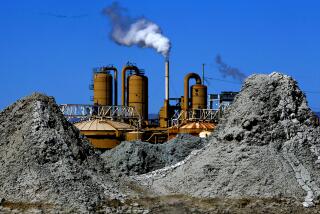Tungsten Depressor
- Share via
BISHOP, Calif. — Back in the 1970s, the Union Carbide tungsten mine outside of this small Eastern Sierra city was by far the largest private employer here, with a payroll of more than 500 workers.
Perched high in the Sierra on private land within Inyo National Forest, shifts worked around the clock mining and milling the metal. But in the early 1980s, when China began flooding the world market with tungsten and driving down the metal’s price, the Bishop mine was forced to cut back. It shut down completely in 1990.
So local officials were elated earlier this year when the price of tungsten rebounded so high that tentative plans were announced to reopen the mine and hire as many as 100 new employees.
“In Inyo County there isn’t much potential for any kind of industry or business that will employ any great number of people,” Inyo County Supervisor Linda Arcularius said. “The jobs up at the mine are really important to the community.”
But the U.S. Defense Department soon threw a chill over the plan when it revealed a proposal to sell off almost a third of the 70 million pounds of tungsten it keeps stockpiled for use in a national emergency.
The sell-off of that much tungsten would cause the price of the metal to drop once again, making it infeasible to reopen the mine, said Tim Scott, vice president of U.S. Tungsten, which now runs the Bishop operation in partnership with Avocet Tungsten.
“That would severely impact our business,” Scott said. “We’re just about at the break-even point right now. In order to run the mine, you have to get a price . . . that covers the cost of mining.”
Inyo County officials and business leaders still speak wistfully about the days when Union Carbide was running the mine at peak production levels and employing many locals in high-paying jobs.
“We used to affectionately refer to it as ‘Uncle Carbide,’ said Bishop insurance agent Chuck Kilpatrick, president of the Chamber of Commerce, who worked at the mine for 10 years and whose father was employed there as a geologist.
“The company was very good to my family and a lot of people in the community, and it was tough to see it close down. The economy never recovered. We would like to see things turn around, and the mine reopening is one way of doing it.”
Without the mine, local fortunes are mostly dependent on tourism, the only other industry of any size remaining.
“The city would be very disappointed if the mine does not reopen because of a tungsten sell-off,” Bishop City Administrator Rick Pucci said. “Our little community has so little industry that any attack on what we do have has a serious effect on our economy. On the other hand, if they do reopen it would have a large positive impact.”
Mine officials and the local government and business community are lobbying Congress to remove tungsten from the list of stockpiled materials that would be sold to help close the federal budget deficit.
The staff of Rep. Jerry Lewis (R-Redlands), who represents the area, said that tungsten has been removed for now from the list of materials to be sold, but that the bill is hung up in the overall budget impasse and could be amended.
The proposal to sell off large amounts of tungsten and other stockpiled materials was intended to raise funds in order to avoid cuts in military retirement pay, according to a spokesperson for the House National Security Committee. It was based on a Pentagon report released this year that concluded that the materials were not needed in the quantities now held.
Tungsten industry leaders have argued that the Pentagon report underestimated the difficulty of replacing the stockpiled tungsten during a national emergency.
Bob Bunting, president of Avocet Tungsten, said that about 80% of the world’s tungsten now comes from China, with another 10% coming from Russia. If large amounts of the stockpiled tungsten are sold, the nation could find itself dependent on importing the metal from one of those countries in an emergency or wartime situation, added Scott of U.S. Tungsten.
The metal is used in the manufacture of bullets and tank ammunition, as well as in cutting tools, drill bits, light bulbs and other products.
Industry officials said that the dumping of the metal on the world market by the Chinese and the resulting drop in price decimated the industry around the world. Most other tungsten mines were forced to shut down, including all of those in the United States and Canada, leaving China as the world’s primary producer, Bunting said.
Bunting added that the Bishop mine, which he said was once the largest in the world, is the only one in the United States or Canada maintained on a standby basis. It could be put back into production in less than six months and at relatively low cost, while other mines would need more than one year to resume operation, Bunting said.
“We’re not saying the government should never sell off anything from the stockpile,” Bunting said. “But they should sit down with the industry and the people that consume tungsten and do it in a properly calculated way.”
More to Read
Inside the business of entertainment
The Wide Shot brings you news, analysis and insights on everything from streaming wars to production — and what it all means for the future.
You may occasionally receive promotional content from the Los Angeles Times.










